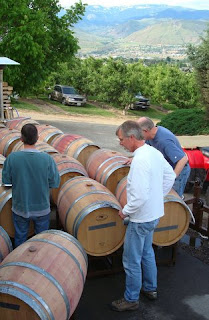 The internet has done a lot for the global wine industry. It promotes the diffusion of useful marketing and research information, facilitates wine tourism, promotes professional collaboration, and helps individual winemakers and regional groups to establish distinct market identities. Many winemakers and winesellers rely upon internet contacts for a good proportion of their sales. If you are reading this blog entry, chances are that you get a lot of your wine information over the internet, too. It’s a good thing, for the most part.
The internet has done a lot for the global wine industry. It promotes the diffusion of useful marketing and research information, facilitates wine tourism, promotes professional collaboration, and helps individual winemakers and regional groups to establish distinct market identities. Many winemakers and winesellers rely upon internet contacts for a good proportion of their sales. If you are reading this blog entry, chances are that you get a lot of your wine information over the internet, too. It’s a good thing, for the most part.
But not everything about the internet is good for winemakers. Do you remember the old New Yorker cartoon with the punchline “On the internet nobody knows you’re a dog?” On the internet we are who and what we pretend to be. Obviously wine marketers can use this fact to tailor the imagine of their wines and winemakers. Nothing surprising there. But, as I have recently learned, there are some predators out there who use the internet to try to take advantage of wine producers.
Karen Wade, who owns the Fielding Hills winery with her husband Mike, recently sent me an email that she received from someone posing as a wine buyer, writing under the subject heading, “I Need Wine for my Birthday Party.”
Hello,
My name is Robert Peter, an American .
I live and work here in Seoul, South Korea.
Actually when I was around last year for chistmas holiday, I got a a bottle of of one of your wines from a friend and i love the taste .since then , I been planning on getting your wines for my birthday party …coming up third week of novemebr here in Seoul, South Korea.
I will be making my payment via my American based credit card .
You are not shipping the wines ….The wines will be picked up at your winery by a licensed shipping agency .This shipping agency have all the appropriate exportation documents and permits .
I got your contact thru your website and I want to know if you will be able to supply me some cases of wines for my upcoming birthday .
Concerning the shipping of the wines , I will refer you to a shipping company that will come for the pick up of the wines in your winery once I have made my payment .
Kindly get back to me so that I can make my orders .
Thanks.
Robert .
Karen writes that
Mike and I receive almost weekly, very official emails from places in Asia wanting to buy wine. They always offer to pay by American credit card and promise to have the wine picked up by their shipper. I answered once and told them to fax me the credit card info and order and never heard anything back.
I guess this indicates that the sort of people responsible for those bogus Nigerian email scams have now become more specialized, targeting wine producers. I wonder if anyone has fallen for this? Have any other winemakers received these emails, or are the Wades just lucky? Do other businesses received specialized scams like this?
On a related note, Mike and Karen Wade received good news this week in the 2008 edition of Tom Stevenson’s Wine Report, one of the best annual guides to global wine. Paul Gregutt, the Pacific Northwest contributor to this volume, rated their winery as the number one “new and up-and-coming producer” in the region. He also listed the 2004 Fielding Hills Cabernet Sauvignon as number four on his list of the ten “greatest quality” wines. That’s high praise for Fielding Hills.
Paul Gregutt has a new book out about Washington wines and wineries. I’ll be posting a review of it later this week.




